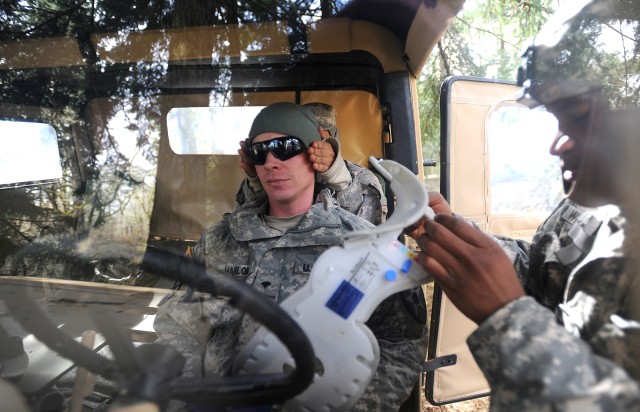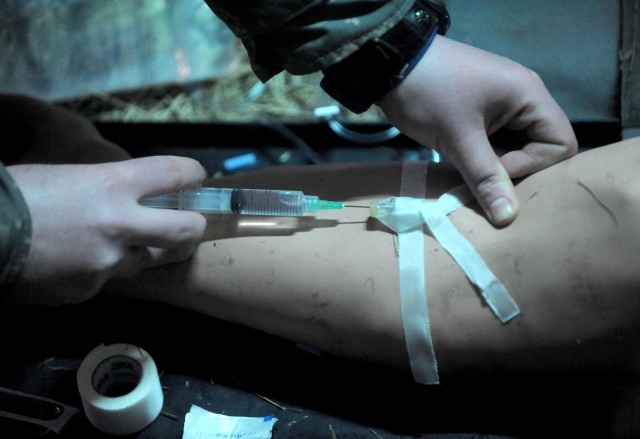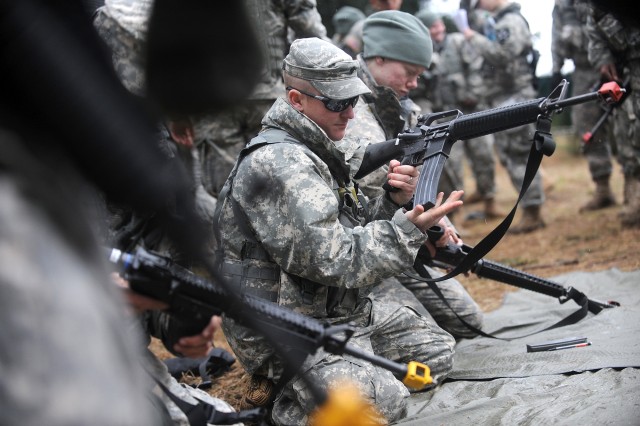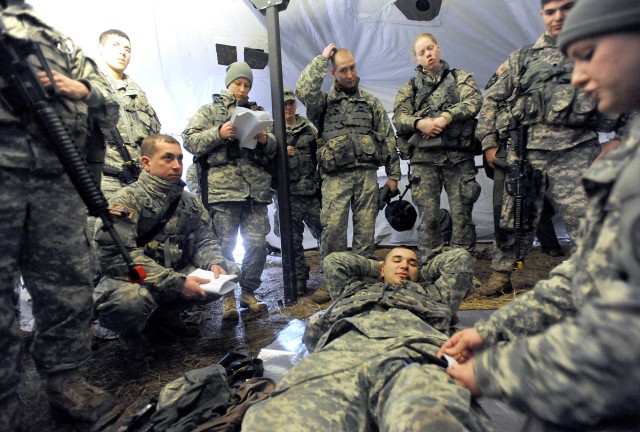JOINT BASE LEWIS-McCHORD, Wash. -- A warrior focus marks Expert Field Medical Badge training and testing, held this year on Joint Base Lewis-McChord.
More than 300 Soldiers from at least 10 different units representing installations across the country are competing for the coveted badge, which on average less than one in five candidates will earn.
Graduation ceremonies will be held at noon today following the final event, a 12-mile road march that ends at Cowan Stadium.
Captain Connie Brisson, 62nd Medical Brigade, said a 2008 update brought several changes to the EFMB testing that reflect a more tactical approach.
"It's a little bit different than the original," Brisson said. "They focus on tactical combat casualty care, warrior skills and communication tasks, day and night land navigation, the road march and a written test."
The EFMB is one of the Army's most challenging events, with a historical average of only 19 percent of candidates earning the badge.
Online resources help candidates prepare for the exams, Brisson said, focusing on tactical combat casualty care, but nothing substitutes for the hands-on training week.
Once the test begins, candidates must pass 11 of the 14 tasks to get a "go" for the day, she said.
"They cannot retest any of the (tasks)," Brisson said. "They get one shot."
The tests include communications, common warrior skill tasks, emergency medical treatment, wounded evacuation, litter obstacle course, day/night land navigation courses, comprehensive written test, cardio-pulminary resuscitation, physical fitness test, weapons qualification and culminate in a 12-mile road march.
Testing facilitator Capt. Mary Nolen said EFMB candidates come from the medical field but are largely not combat medics.
"Dental assistants, phlebotomists - you name it - there's a variety of Soldiers out here today," Nolen said.
The facilitator said female Soldiers made up a significant percentage of badge candidates. The demographics spanned all ages and ranks.
"They are not necessarily new to the Army, but new to a lot of these tasks," Nolen said. "There are a lot of specialists out there."
Preparations for hosting and facilitating EFMB testing has been an intense, consuming event in itself, she said, requiring extensive planning, coordination and operational support.
More than 400 members of the 62nd Med. Bde. serve as role players, evaluators, or to provide logistical support during the testing.
"It's been a while," Nolen said. "We've been out here non-stop since (Feb. 9)."
On Day 2 of the training phase, candidate Capt. Myro Lu worried about the weather but said he felt things were going well.
"I am part of the hospital at Madigan, so it's a rare opportunity where we can come and see what the other Soldiers of the Army are doing," Lu said. "It was a good experience for myself."
Lu said he considered the on-site training key to passing the test.
"There is always going to be some element of surprise," he said. "You can read about it as much as possible or you can have certain train ups, but it's not until you are actually there and entrenched with everybody else when you are going to get that full experience."
Testing lanes included real-world scenarios like simulated IEDs and direct fire. Performing emergency medical procedures to save a patient's life is stressful enough. Doing it under enemy fire is a whole different ballgame.
Captain Anna Kraus with 2nd Brigade, 2nd Infantry Division said she took on the EFMB challenge for many reasons. "I am a (medical) provider, and I am stuck in a clinic all day, and this was an opportunity to get out and learn the medical side of the Army - more down at the soldiering level and how it's conducted on the battlefield - tactical field care," Kraus said. "I don't have a background in that."
Brushing up on all soldiering skills as well as field medical care tasks were important to her preparation, she said.
"There's a lot of the stuff I haven't seen before," Kraus said. "We're going over it multiple times and getting there. I think I will do all right."
The weeklong training phase preceded testing, which started Monday and ends today.
Candidate Pfc. Clare Dudash, with the 702nd Brigade Support Battalion, said she's taking the EFMB challenge after completing her first year in the Army.
"There were a lot of people talking about it and how rare it is and it's a good experience," Dudash said. "I always enjoyed the training aspect in (advanced individual training), so I was excited to come out here."
So far, she has enjoyed the new skills she's learned during EFMB testing far more than AIT and basic training, she said.
"It's all medical," Dudash said. "You don't have the stress of the drill sergeant yelling at you. It's all about the learning aspect. I haven't been in the Stryker yet, (but) I am sure I can get a lot from this."
The EFMB training and testing have helped build her confidence.
"I feel a lot better now that we are having this week to get trained up," Dudash said. "I think I will do well and I will certainly learn a lot."
Rick Wood: rick.wood@nwguardian.com








Social Sharing